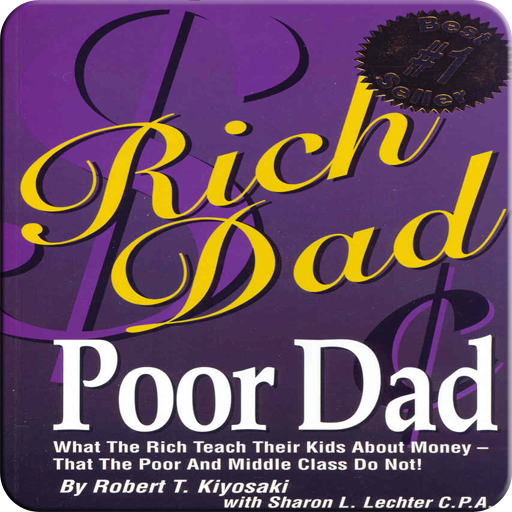In my world, real assets fall into the following categories.
依我看,真正的資產(chǎn)可以分為以下幾類:
First,businesses that do not require my presence: I own them, but they are managed or run by other people.
不需我到場(chǎng)就可以正常運(yùn)作的業(yè)務(wù)。我擁有它們,但由別人經(jīng)營和管理。
If I have to work there, it's not a business. It becomes my job.
如果我必須在那兒工作,那它就不是我的事業(yè)而是我的職業(yè)了。
Then common categories such as stocks, bonds, neutral funds, income-generating real estate, notes or IOUs, royalties from intellectual propertysuch as music, scripts, patents and finally anything else that has value, produces income or appreciates, and has a ready market.
常見類別,例如股票;債券;共同基金;能夠產(chǎn)生收入的房地產(chǎn);票據(jù)(借據(jù));版稅,如音樂、手稿、專利;其他任何有價(jià)值、可產(chǎn)生收入或有增值潛力并且有很好銷路的東西。

As a young boy, my educated dad encouraged me to find a safe job.
當(dāng)我還是孩子的時(shí)候,我受過良好教育的爸爸就鼓勵(lì)我找份安穩(wěn)的工作。
My rich dad on the other hand encouraged me to begin acquiring assets that I loved.
而富爸爸則鼓勵(lì)我去獲得我所喜愛的資產(chǎn)。
"If you don't love it, you won't take care of it."
"因?yàn)槿绻悴幌矚g它,就不會(huì)關(guān)心它。"
I collect real estate simply because I love buildings and land. I love shopping for them.
我選擇房地產(chǎn)是因?yàn)槲蚁矚g建筑物和土地,我喜歡購買它們。
I could look at them all day long.
我愿意整天看著它們。
When problems arise, the problems aren't so bad that it changes my love for real estate.
即使有問題出現(xiàn),也不會(huì)糟到使我不再喜愛它們。
For people who hate real estate, they shouldn't buy it.
但對(duì)于那些本來就憎惡房地產(chǎn)的人來說,投資房地產(chǎn)顯然不是一個(gè)好主意。
I love stocks of small companies, especially start-ups.
我喜歡小公司的股票,尤其是剛成立的公司。
The reason is that I am an entrepreneur, not a corporate person.
因?yàn)槲沂且粋€(gè)企業(yè)家而不是一個(gè)雇員。
In my early years, I worked in large organizations, such as Standard Oil of California, the U.S. Marine Corps, and Xerox Corp.
我早年也曾在一些大機(jī)構(gòu)工作,如加利福尼亞標(biāo)準(zhǔn)石油公司、美國海軍陸戰(zhàn)隊(duì)和施樂公司。
I enjoyed my time with those organizations and have fun memories, but I know deep down I am not a company man.
在這些機(jī)構(gòu)做事給我留下了愉快的回憶,但我深知我不只是一名雇員。
I like starting companies, not running them.
我喜歡開辦公司但不喜歡去經(jīng)營它們。
So my stock buys are usually of small companies.
所以我買的股票都是小公司的。
And sometimes I even start the company and take it public.
有時(shí)我甚至自己創(chuàng)辦小公司并把它們上市
Fortunes are made in new stock issues, and I love the game.
在新股發(fā)行中創(chuàng)造財(cái)富,我喜愛這種游戲。
Many people are afraid of small-cap companies and call them risky, and they are.
許多人害怕買小公司的股票,認(rèn)為它們風(fēng)險(xiǎn)大,事實(shí)上也確是如此。
But risk is diminished if you love what the investment is, understand it, and know the game.
但是如果你喜愛你所投資的對(duì)象,了解它并懂得游戲的規(guī)則,風(fēng)險(xiǎn)就會(huì)降低。
For years, even while I was with the Marine Corps and Xerox, I did what my rich dad recommended.
多年來,甚至當(dāng)我還在海軍陸戰(zhàn)隊(duì)和施樂公司做事的時(shí)候,我就按照富爸爸的建議去做事。
I kept my day time job, but I still minded my own business.
我上班,但同時(shí)也關(guān)注自己的事業(yè)。
I was active in my asset column. I traded real estate and small stocks.
我通過買賣小公司的股票和房地產(chǎn),努力增加我的資產(chǎn)項(xiàng)。
Rich dad always stressed the importance of financial literacy.
富爸爸總是強(qiáng)調(diào)財(cái)務(wù)知識(shí)。
The better I was at understanding the accounting and cash management, the better I would be at analyzing investments and eventually starting and building my own company.
我對(duì)會(huì)計(jì)和現(xiàn)金管理懂得越多,我就越能更好地進(jìn)行投資分析并開始建立自己的公司。
I would not encourage anyone to start a company unless they really want to.
我并不鼓勵(lì)那些不想創(chuàng)立自己公司的人也去這么干。
Knowing what I know about running a company, I wouldn't wish that task on anyone.
因?yàn)橹榔渲械那郏晕也⒉幌M總€(gè)人都去經(jīng)營公司。
There are times when people can't find employment or starting a company is a solution for them.
不過,當(dāng)人們找不到工作時(shí),開公司倒是個(gè)解決的辦法。
The odds are against success: Nine out of ten companies fail in five years.
但失敗的幾率是這樣的:新公司中10成有9成會(huì)在5年內(nèi)倒閉。
Of those that survive the first five years, nine out of every ten of those eventually fail as well.
存活下來的公司在下一個(gè)5年內(nèi)又會(huì)有9/10最終倒閉。
So only if you really have the desire to own your own company do I recommend it.
所以只有當(dāng)你真的想擁有自己的公司時(shí),我才建議你這么做。
Otherwise, keep your day job and mind your own business.
否則,你還是繼續(xù)上班并關(guān)注自己的事業(yè)吧。



